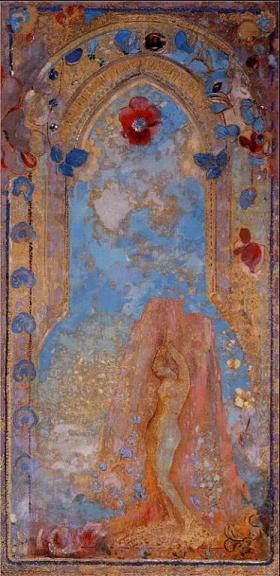
LIFE AS MYTH
![]()
JOURNAL
![]()
JOURNAL 2007
![]()
Following a white hart
Exploring myth & meaning
![]()
SPRING 2007
The gift of fire
![]()
LIFEWORKS
![]()
ATLAS
![]()

SPRING 2007
THE QUEST OF PERSEUS
Polydectes, king of the island of Seriphos, lusted for Danae, the mother of Perseus. Wishing to pursue the mother unchallenged, the king devised a way to be rid of her son. He held a banquet where he required from each guest the gift of a horse. Perseus had none and so promised to bring some other offering instead. Polydectes demanded the head of the Medusa.
The Medusa was once a beautiful woman who fell in love with Poseidon. They had a tryst in the temple of Athena and when the goddess found the pair, she transformed her into a Gorgon. A Gorgon was a winged beast who had a tangle of serpents for hair and whose visage was so monstrous that it turned the beholder into stone. Since no mortal had ever survived a battle with the Medusa, Polydectes was certain that this quest would be the death of Perseus. However, before he left, Athena and Hermes gave Perseus two weapons especially suited for the battle: a highly polished shield and the adamantine sword.
In order to locate the Medusa, Perseus first visited the Graeae, the three blind sisters of the Gorgons. The Graeae shared one eye and one tooth. As they were passing the eye back and forth, Perseus seized it. He agreed to return it in exchange for the location of the Gorgons. The sisters reluctantly complied and our hero embarked for the lair of the Medusa.
All three Gorgons were sleeping when Perseus entered their cave. Rather than risking his death by looking directly in the Medusa's face, he beheaded her by using his divine shield as a mirror. He quickly stowed the severed head in a bag as proof of his conquest for Polydectes. The other two Gorgons awoke and chased Perseus but the Medusa's magical blood transformed into the mythic horse Pegasus and on his winged back, he escaped. Pegasus is a Renaissance addition to this myth. In earlier versions, Perseus defeats the Medusa and completes his hero's journey with the aid of winged sandals.
During the return to Seriphos, Perseus stopped in the kingdom of Ethiopia. Queen Cassiopaeia had brought a curse on the kingdom by bragging that she was equal in beauty to the goddess Aphrodite. Aphrodite punished the kingdom by sending a treacherous sea serpent. An oracle told Cassiopaeia, in order to save the kingdom, she must chain her daughter Andromeda to a rock at sea for the monster to devour.
Perseus battled the sea serpent and won. He then freed Andromeda and claimed her as his bride. However, she was already betrothed to Phineus. At the wedding, a quarrel broke out between the two men and Perseus unveiled the Medusa, turning his rival into stone. Ultimately Perseus returned to his homeland of Seriphos. When he arrived, he learned that Polydectes was pursuing his mother so violently that she had gone into hiding. Perseus then killed the king with the head of the Medusa.
Andromeda. Odilon Redon. 1912. Arkansas Art Center, Little Rock.

